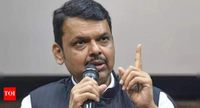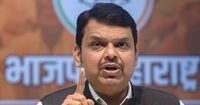In a growing controversy over language education in Maharashtra, the Maharashtra Navnirman Sena (MNS) has urged RSS chief Mohan Bhagwat to intervene against the state government's decision to make Hindi a mandatory third language for students in primary schools. MNS leader Sandeep Deshpande expressed concerns that the imposition of Hindi could lead to divisions among Hindus, stating, "The imposition of Hindi will divide Hindus. It will prove detrimental for the country." He referenced the historical context of the Maratha empire, noting that despite their influence across India, they never enforced a single language upon the populace.
The Maharashtra government approved this three-language policy on April 17, 2025, aligning with the National Education Policy (NEP) 2020, which mandates that students from Classes 1 to 5 learn three languages: Hindi, Marathi, and English. This decision has faced significant pushback from various political parties, including the MNS, Shiv Sena (UBT), and Congress, all of whom have criticized the move as unnecessary and potentially harmful.
Chief Minister Devendra Fadnavis defended the policy, asserting that while Hindi would be taught, it would not replace Marathi, which remains compulsory. He stated, "It is wrong to say that attempts are being made to impose Hindi. Marathi will be compulsory in Maharashtra. There will be no other compulsion." Fadnavis emphasized the importance of learning multiple languages, noting that the NEP requires at least two of the three languages to be Indian.
In a letter to the chief minister, the Language Advisory Committee of Maharashtra also opposed the introduction of Hindi as a third language, arguing that it is neither academically justified nor aligned with the psychological needs of students. They suggested that the policy could place undue pressure on young learners and proposed that the requirement for learning multiple languages should be enforced starting from higher secondary education instead.
On April 20, 2025, the committee's chairperson, Laxmikant Deshmukh, reiterated these concerns, stating that the decision to make Hindi mandatory from Class 1 would burden students. He criticized the lack of consultation with educational experts before finalizing the language policy, asserting that, "The forced decision on Hindi language is unnecessary." Deshmukh's letter highlighted the existing challenges in teaching Marathi and English in schools, where resources are already limited.
Deshmukh further argued that the introduction of Hindi at such an early stage could lead to cognitive overload for children, complicating their learning process. He stressed that the primary education framework should prioritize teaching in students' mother tongues and that the implementation of a three-language policy should be reserved for higher educational levels.
As the debate intensifies, Fadnavis clarified that if schools wish to offer another Indian language instead of Hindi, they could do so provided there are at least 20 students interested in that language. However, if the numbers do not meet this threshold, the state may explore online teaching alternatives.
The controversy has sparked a broader discussion about linguistic identity in Maharashtra, with opposition parties alleging that the central government is attempting to impose Hindi on non-Hindi speaking states. Critics argue that such measures undermine regional languages and cultures.
In the wake of the backlash, Fadnavis has attempted to maintain that the policy does not seek to diminish the status of Marathi. He acknowledged the necessity of Hindi as a convenient language for communication across India, stating, "Hindi has become a convenient language. It is useful to learn it." However, the insistence on Hindi's inclusion in the curriculum has led to protests and demands for the government to reconsider its stance.
As the situation unfolds, the MNS and other political factions continue to voice their discontent, emphasizing that the imposition of Hindi could fracture the unity they seek to promote among Hindus. Deshpande's letter to Bhagwat encapsulated these sentiments, urging for a withdrawal of the policy to avert potential discord among communities.
The Language Advisory Committee's opposition highlights a critical moment in Maharashtra's educational policy, where the balance between national integration and regional identity is being tested. As the state government navigates these turbulent waters, the implications of this decision on Maharashtra's linguistic landscape remain to be seen.




